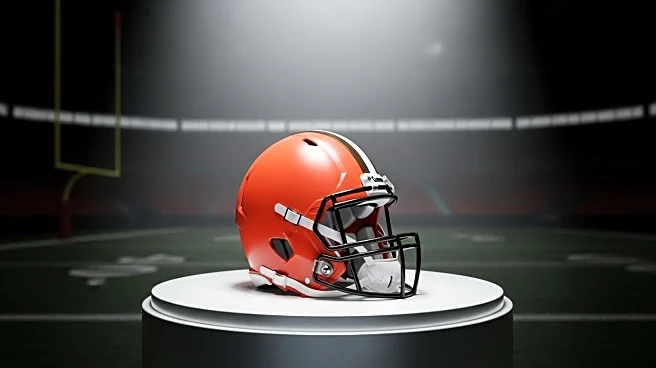What's Happening?
Cleveland Browns head coach Kevin Stefanski has announced that rookie Dillon Gabriel will start as quarterback against the Minnesota Vikings, replacing veteran Joe Flacco. This decision comes as the Browns seek to improve their offensive performance, which has been struggling despite having one of the league's best defenses. Gabriel's start marks a significant change, as he becomes the 13th rookie quarterback to start for the Browns since their return to the NFL in 1999. The Browns are currently ranked second-worst in scoring and 27th in total yards, with Flacco having thrown six interceptions in the first four games. Gabriel's debut will be historic as he is the first quarterback to make his first career start in an international game.
Why It's Important?
The decision to start Dillon Gabriel is crucial for the Browns as they aim to address their long-standing quarterback issues. Gabriel's performance could potentially stabilize the team's offensive struggles and provide a long-term solution to their quarterback dilemma. The Browns' defense, led by Myles Garrett, has been consistently strong, but the lack of offensive support has hindered their overall success. Gabriel's ability to perform under pressure against a formidable Vikings defense will be a key factor in determining the Browns' future strategy. The move also highlights the team's willingness to invest in young talent and adapt to changing circumstances.
What's Next?
As Dillon Gabriel prepares for his first NFL start, the Browns will need to focus on supporting him through strategic play-calling and solid defensive performance. The team may consider increasing their run-play rate to alleviate pressure on Gabriel, given their current low run-play percentage despite having a capable running back in Quinshon Judkins. The Browns' pass catchers, including Jerry Jeudy, will need to improve their performance, as dropped passes have been a significant issue. The upcoming game against the Vikings will be a test of Gabriel's readiness and the team's ability to adapt to new dynamics.
Beyond the Headlines
The Browns' decision to start Gabriel reflects broader trends in the NFL, where teams are increasingly relying on young quarterbacks to rejuvenate their rosters. This shift underscores the importance of developing talent and the potential risks and rewards associated with starting rookie quarterbacks. The Browns' ongoing quarterback challenges also highlight the complexities of team management and the impact of past decisions, such as moving on from Baker Mayfield and trading for Deshaun Watson.









